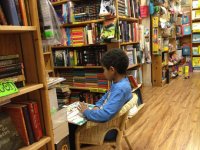10 Ways to Cultivate a Love of Reading in Students
Suggestions for how teachers in all subjects can guide students to learn to love reading, and how parents and administrators can help.
Your content has been saved!
Go to My Saved Content.As a teacher, I was obsessed with cultivating a love of reading in my students. I love to read, loved it as a kid too. I'm equally compelled to ensure that my own child loves reading -- and he does. I well aware that I'm on a mission -- but I also know it's a worthy one!
Here are ten suggestions for how any teacher, teaching any subject can participate in this mission, and how parents and administrators can help.
1. Read. Simple first step! If we're going to encourage kids to read we need to do it too. Read for pleasure, information, instructions, connecting with others, and so on. Read. Read a little more than you've been reading lately.
2. Share your reading experiences. Share with colleagues, friends and students. Tell them what you've been reading, what you've gained or learned from these texts, what you recommend. As a teacher, I very intentionally and regularly told my students what I was reading, where I read, ("in the bath!"); I brought in the books I read, I read passages to them, I read during silent reading, I told them about how I couldn't wait for the weekend so that I could read, about my book club arguments, the stories my husband I read aloud to each other...and so on. Help them see what a reader does. Also -- I recently discovered Goodreads where you can share, get recommendations, and read reviews that friend have written -- I had so much fun on this site and was reminded of how socializing and reading are a perfect match. If you are on Goodreads, or join, find me there! I'd love to hear about what you're reading. I also wonder if there's an equivalent for kids to use -- anyone know?
3. Invite students to socialize around reading. Set up book clubs, reading groups, literature circles. Many students (especially boys) need to interact with each other around texts. It greatly enhances their comprehension and makes it so much more enjoyable. Adults know that (we join book clubs and spend hours on Goodreads) so let's help kids have this experience too.
4. Organize a Read-a-Thon. A beautiful event that parents and administrators can take a lead on setting up. My son's school recently did a Read-a-Thon and it was the highlight of the year for my boy. Kids wore PJs, took their pillows and stuffed animals to school, were invited to re-read their favorite books or select a "challenge book." Parents supplied snacks, teachers and administrators read. It was fun and community building and they raised a lot of money.
5. Take a field trip. This is another way to make reading social and exciting. Visit your local library, a university library or a bookstore. It's not about checking out or buying books -- it's about being surrounded by thousands of books, touching their gorgeous pages, seeing the world of possibility in print, salivating over what there is to know and explore. In my family, we often take weekend trips to explore different bookstores in the area. We make it an adventure and talk about what constitutes a "good bookstore;" it's just fun. This is another event that parents can organize and administrators can support or encourage.
6. Listen to audio books. Invite students to listen to them; play short passages. To me, audio books "count" as reading. While you're not developing decoding or fluency skills, you are acquiring vocabulary, applying comprehension strategies, and enjoying stories or accruing information. Some of the audio books I've listened to have stuck with me in ways that reading text hasn't. My mind was free to visualize the scenes in a way that creating lasting images. (One such book like this was Native Son by Richard Wright. A phenomenal listen).
7. Invite authors to speak. Another activity that can be supported by admin and parents. Kids can be greatly impacted from hearing an author (if possible, especially one from a similar background to theirs) speak about reading and writing.
8. Make connections between reading and other issues. I just read this this fascinating article in Harper's about how people in Mali hid their ancient sacred texts as Islamic militants took over Timbuktu. Books and reading have always been political (think banned books, prohibitions on slaves becoming literate, etc.). Help students see the wider, historical and political context of the importance of reading to enhance their appreciation.
9. Learn about specific needs for specific populations. Those responsible for teaching literacy also need professional development in how to serve specific vulnerable populations. One book that dramatically changed how I taught reading in middle school is Reading Don't Fix No Chevys, by Wilhelm and Smith. If you teach boys, you must read this book! Another equally impactful book for me was Teaching Reading to Black Adolescent Males, by A. Tatum. We need to meet the needs of all learners.
10. Teach reading strategies. Finally, I believe that all teachers, in every content area, should be responsible for teaching reading. Text genres are different in every content area -- teachers should receive PD in how to teach reading strategies so that they can do so with students. Kids won't enjoy reading if they can't do it -- no one loves doing something that's really hard. We must give them the skills to read at the same time that we cultivate an attitude.
There's so much more we can all do -- from the superintendent to the classroom teacher, the custodian to the parent's association. I'm tempted to turn this list into "20 things..." but I'll stop here and invite your participation.
